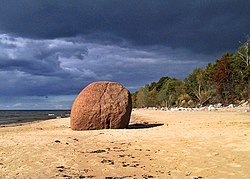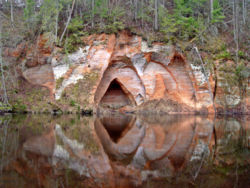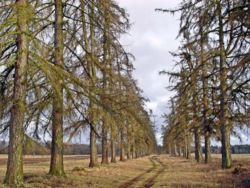


The North Vidzeme Biosphere Reserve (NVBR, Ziemeļvidzemes biosfēras rezervāts) is the only biosphere reserve in Latvia. It is in the northern Vidzeme region along the border with Estonia.
The coastal part consists of sandy beaches, coastal meadows and areas of bare rocks. The area is important from a conservation point of view since it harbours raised bogs, wild rivers with wild Baltic salmon, coastal meadows which are traditionally maintained by grazing and remnants of the ancient broad leaf forest.
Understand
[edit]North Vidzeme Biosphere Reserve includes 53 km of coastline on the Gulf of Riga. It covers 4,750 km² of land in the catchment basins of the Salace, Svetupe and Vitrupe Rivers (i.e. roughly 6% of Latvia), of which: 184 km² are sanctuaries, 1,600 km² are landscape protection zones, 1,625.6 km² are neutral zones. In 2017, almost 60,000 people lived in the reserve. The landscape is characterized by lakes (over 60 greater than 3 hectares) and by the gentle, glacially formed hills and rolling plains.
Boreal coniferous and mixed forests; wetlands; raised bogs and open bog pools; fens and wet meadows; lakes and rivers; coastal dunes and marine littoral area; extensive agricultural and urban areas.
The reserve includes a multitude of diverse natural and semi-natural habitats. It encompasses vast areas of primeval and traditional landscapes. The area includes 25 nature reserves, one nature park and two marine protected areas. More than a half of NVBR terrestrial area is covered by forests and swamps, value of which is confirmed by a fact that out of 28 protected areas in NVBR 20 were established particularly for protecting forest and swamp habitats.
NVBR area is attractive for tourists for its amazing nature values—river Salaca, that starts its 95-km-long journey from the scenic Lake Burtnieks and finishes it in the Baltic Sea.
Tourism information centre administrated by local municipalities are located in Salacgrīva, Limbaži, Rūjiena, Mazsalaca, Ainaži, Aloja, Strenči and Valka.
History
[edit]The nature protected area encompasses approximately 6% of the total area of Latvia, including several towns, industrial and infrastructural objects.
The North Vidzeme Biosphere Reserve was created on 11 December 1997 and since 1997 it was internationally recognized in the UNESCO Man and the Biosphere Programme. It is part of the World Network of Biosphere Reserves.
Landscape
[edit]Flora and fauna
[edit]Climate
[edit]Get in
[edit]Fees and permits
[edit]Get around
[edit]See Vidzeme#Get around.
Otherwise, on foot or by bicycle is probably the best way to see the area.
See
[edit]The main points of interest in the North Vidzeme Biosphere Reserve are:
- Salaca River — With mostly fast stream, multiple sandstone cliffs and caves, suitable for several days long boat trips. A popular destination of local tourism is Mazsalaca. For water tourists Salaca River is always an adventure - peaceful and scenic sections interchanging with impressive canyons including the locally famous echo cliff Skaņaiskalns. Museum in Valtenberģu manor with expositions as Genealogy tree room, 31 Walter Hirt tree sculpture collection hunting trophies, play mouse collection. The longest natural caves of Latvia, the 300-m-long Dauģēni or X caves are located at Salaca.
- Seda swamp and area — A great place for nature lovers and opportunity to discover soviet heritage in Seda town. Seda heath is nevertheless one of the most important Natura 2000 territories in Latvia, with a great diversity of landscapes, biotopes and biology – birds in particular. This is a good place for bird-watching during migration season, and viewing towers have been set up on the edge of the swamp for this purpose
- Rūjiena — In Latvia, Rūjiena is known for its delicious and multi-flavoured ice cream. Rūjiena is often called the ice-cream capital. They think of themselves more as an art-loving town. Several nationally and internationally known artists were born in Rūjiena. Town has several artist studios, an art school, and the town is decorated with many pieces of art.
- Some of the places to visit in Rūjiena:
- Terneja Park
- The Sower
- Madonna Orans
- Monument "The Bugler of Tālava"
- Rūjienas Ice-cream factory
- Naukšēnu Manor
Do
[edit]- Vidzeme beach — The most popular site is Randu meadows, pristine, sandy beaches with sandstone cliffs (Veczemju), waterfalls and boulders. There are Salacgrīva and Kuiviži port.
- Burtnieks Lake — The fourth biggest lake in Latvia stretching 13.5 km long in the western part of Northern Vidzeme. Average depth – 2.9 m, maximum depth – 4.1 m, width – 5.5 km. 23 bigger and smaller rivers flow into the lake. More than 20 various species of fish inhabit the lake. Lake is popular for bird watchers and anglers.
- The Ziemeļvidzeme nature education centre offers nature awareness programs for different target groups. The centre is in Salacgrīva.
- Hiking – For those who want to explore the nature values of NVBR by themselves, hike some of the 18 nature trails of NVBR. They can range from a carefree walk on a wooden footbridge and a well-trampled soil path, to an almost extreme adventure with overcoming different obstacles. Some of the trails also offer a chance to observe the landscape from different watching towers and platforms.


